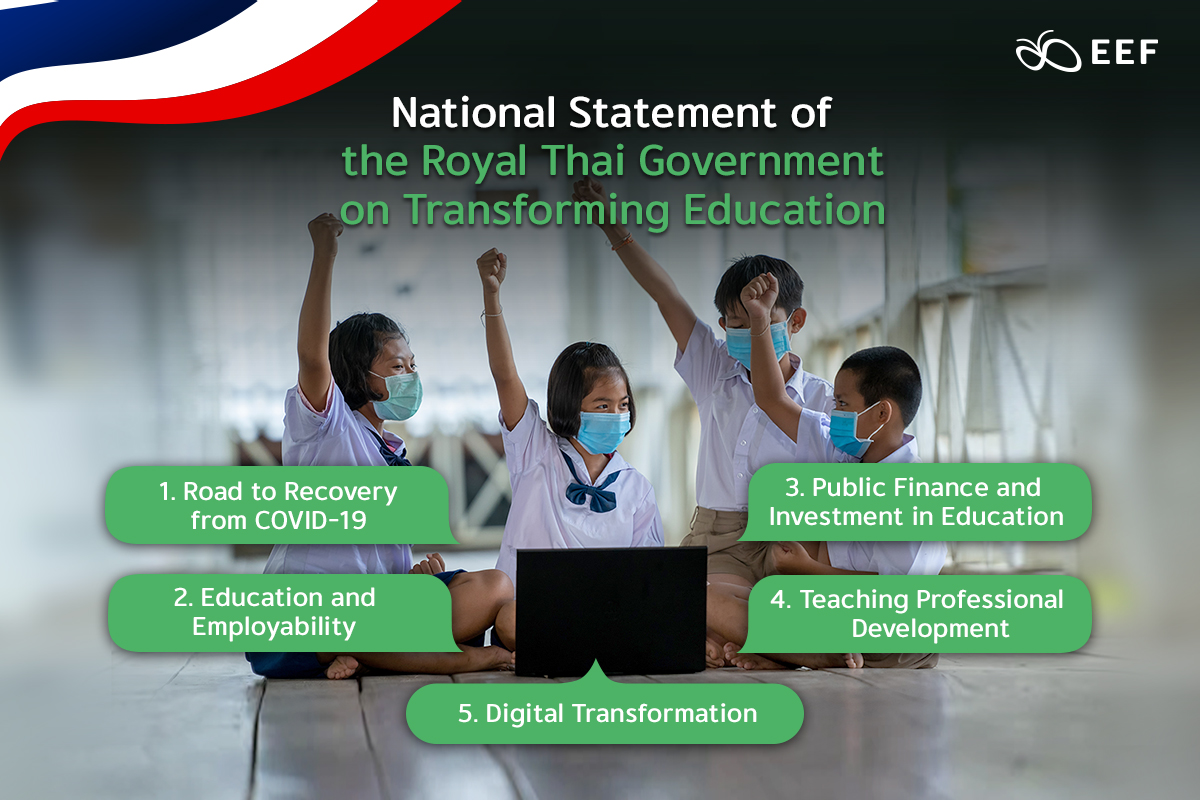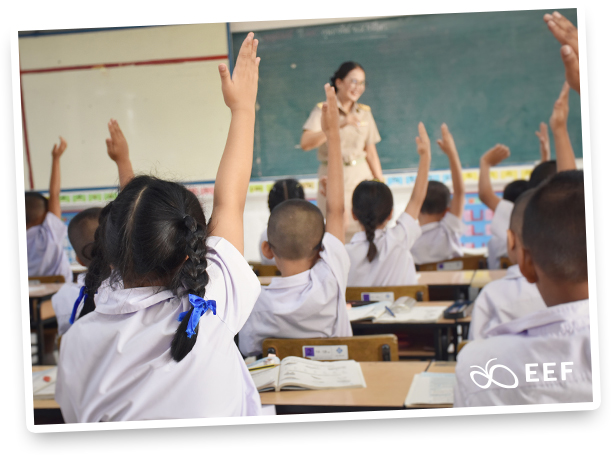
The Constitution of the Kingdom of Thailand upholds education as a vital element by declaring the State to provide thepeople with education as needed in various systems including promoting life-long learning and enabling cooperation among the State, local administrative organizations, and the private sector.
 It is the duty of the state to provide, carry out, supervise, promote and support every level of education as per educational provisions and international standards. As per the law and the national education plan, those provisions must include implementation and inspection to ensure compliance with the National Education Plan.
It is the duty of the state to provide, carry out, supervise, promote and support every level of education as per educational provisions and international standards. As per the law and the national education plan, those provisions must include implementation and inspection to ensure compliance with the National Education Plan.
Education has also been confirmed as one of the national priorities in the 20-Year National Strategy (2018-2037) and the National Scheme of Education (2017-2036), as one of the key factors in developing our citizens to ensure that they are provided with the essential tools to help the nation achieve the sustainable development goals and unlock the ability to develop and support various sectors in the future.

Thailand is committed to ensuring a safe return to school for all students. With commendable efforts to provide education in the Post-COVID-19 era, the Government has pledged to do their best to design several educational initiatives to recover from the learning loss. This requires prioritizing the safe reopening of schools, as well as setting up strategies to ensure that all learners return to school and other educational institutions with targeted measures. We will focus on
those most at risk of not returning, or who are out of school, including strengthening flexible alternative learning and equivalency programmes and ensuring learners’ and teachers’ health and well-being are taken care of. Most importantly for the future of education, the Thai government aims to prepare and implement strategies to secure our future education and protect it from further closures due to the pandemic of COVID-19 or any other emergencies. Learning loss problems shall be executively addressed by mobilizing stakeholders to provide prompt aid and return dropouts to school with financial support.
Moving forward, the Government of Thailand is committed to ensuring the continuity of learning for all, as well as being dedicated to organizing environmentally friendly education for all learners now and in the days, weeks, months, and years to come. Our planned blended learning approach will address all forms of exclusion, disparity, and inequality regarding access to education, such as age, gender, socio-economic status, language, nationality, and religion. Emphasis shall be placed on encouraging those who are disadvantaged and vulnerable to stay in school and prevent early school dropouts.

The Government will always encourage the public and the private sectors to join forces in creating an education system consisting of global trends, the promotion of global citizenship and teaching of the 21st century skills to give students the knowledge and confidence to be employable nationally and internationally. A culture of lifelong learning will be highlighted to ensure more opportunities for the existing workforce to reskill and upskill to enable them to keep pace with new technologies and innovations, particularly skills related to promoting green economies. The Government will mobilize active participation from the industrial and
private sectors to jointly identify new skills needed in the future to enable the linkage of education and employability.

Recognizing the needs to reduce the cost burden of learners and increase the capacity of educational institutions, the Government has recently approved an increase of per capita subsidies based on basic necessities starting in the fiscal year of 2023 (October 2022). A clear framework for educational support and the education budget will be considered to support educational resources that are efficient, equitable, fair and consistent with changes, including monitoring the system’s fluidity and accountability. This is in line with the ‘Paris Declaration: A Global Call for Investing in the Futures of Education, which urges governments to increase domestic resources with additional investments to recover from COVID-19. Innovative financing models, with the cooperation of stakeholders such as the Equitable Education Fund, Thailand is now being introduced to ensure adequate funding for disadvantaged groups.

Bearing in mind that teachers play a critical role in providing quality education and support for the transformation of education, we will ensure that teachers are well equipped with innovative learner-centred pedagogical skills and competencies to manage diverse classroom environments. Teachers will also be provided with more opportunities to reskill and upskill to enable them to keep pace in the volatility, uncertainty, complexity and ambiguity (VUCA) world. They will be provided with strong support structures including digital platforms and adequate opportunities to exchange with peers, promoting collaborative learning, and improving best teaching practices through professional learning communities (PLC).

A learner-centred digital transformation will be supported to improve learning for all and prepares learners to navigate a world characterized by fast-evolving technologies and changes. We will aim to provide free, inclusive, and equitable access to online education through open source platforms under the supervision of the Ministry of Education and relevant agencies. We will focus on quality e-learning programmes, relevant teacher training, and policies that mainstream digital learning and ensure the safe use of digital technology and artificial intelligence.
Recognizing that education is fundamental to development and the national growth, we will put our strong efforts into transforming education to ensure that learners will be well equipped with the appropriate skills to enhance employability and become global citizens in order to have full potential to address global challenges.


